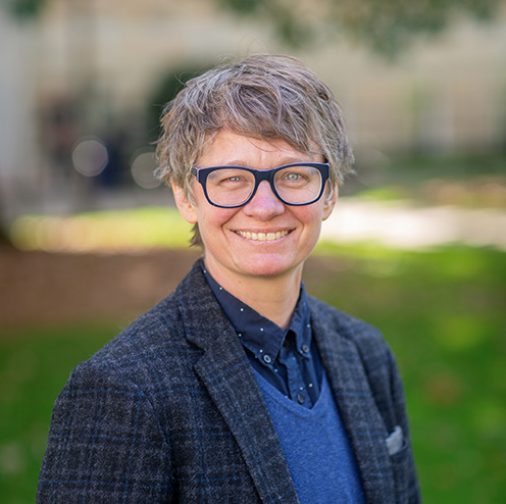Please join us for the spring 2022 Joint University of Waterloo–St. Jerome’s University Legal Studies Seminar:
Queer Methods in Legal Analysis: Sperm Donation and the Biopolitics of Reproduction
Speaker: Dr. Stu Marvel (Emory University)
When: Thursday, June 16, 2022 at 11 a.m. EDT
 About
the
speaker:
About
the
speaker:

Dr. Stu Marvel, Assistant Professor at Emory University, was previously a Lecturer at the University of Leeds School of Law and Distinguished Scholar in Residence at the Emory University School of Law. Her writing and teaching is on issues related to reproductive technology, kinship, vulnerability, and queer and feminist legal theory, as well as on questions of gender-based violence and sexual harm. Dr. Marvel received her PhD and LLM from Osgoode Hall Law School, as well as an MA in Gender Analysis for International Development from the University of East Anglia. She has held visiting scholar positions at Northeastern University; the Centre for Law, Gender and Sexuality at Kent Law School; and the Feminism and Legal Theory Project at Emory Law School, and was a fellow with the Harvard Institute for Global Law and Policy. Previously, Dr. Marvel worked as communications liaison at the Korean National Commission for UNESCO in South Korea and served as gender advisor to the Ministry of Women in The Gambia.
Abstract:
Recent scholarship in queer theory has turned itself to problems of methodology and, in particular, the operation of taxonomical categories (Ghaziani and Brim 2019). For example, Scott Morgensen’s work has examined the ideological and institutional structure of Federal Indian Policy to understand both its production of compulsory heterosexuality, as well as strategies of native opposition to the straitened categories of marriage, children, and descent through blood quantum (Morgensen 2016). While scholarship at the intersection of queer and legal theory has long struggled to articulate the normative concerns of law within anti-normative queer theoretical frames (Halley 2017, Cossman 2019, Thomas 2019), this recent turn to queer methods may prove especially fruitful for feminist legal analysis. Queer attention to issues of partiality, silence, erasure and uncertainty offer a set of resistant and mobile analytical frames which can helpfully trouble the classificatory boundaries of law.
This paper will explore such a turn to queer legal methods through an analysis of the recent case Norman v. Xytex Corp.WL 5752325 (2020) involving an action by a lesbian couple against a Georgia sperm bank. The women alleged that Xytex had sold them human sperm under false pretenses about the characteristics of the sperm donor, and that the child conceived with that sperm thereby suffered from unforeseen impairments. As Georgia state law bars wrongful birth claims, under precedent that holds that “[r]espect for life and the rights proceeding from it are at the heart of our legal system and, broader still, our civilization” (Cockrum v. Baumgartner 447 N.E.2d 385, 389 (1983), the court refused to allow a claim for damages in tort that presumed that life itself can ever be an injury. Yet it allowed other claims by the Normans to proceed, including those of negligent misrepresentation and violation of the Fair Business Practice Act.
This paper will explore typologies around the categorizations of health and normality promised to purchasers within the marketplace for human reproductive materials. I will use a queer lens to consider the origins and effects of legal categories such as negligent misrepresentation and wrongful birth, and ask how an approach that embraces misalignments between apparently stable categories might produce a different set of legal logics. How might this queer approach infuse and reorient longstanding feminist legal concerns around reproductive technology and disability justice? Even more broadly, how might queer and feminist legal theories locate themselves more productively in conversation? Ultimately, I am interested in exploring how the biopolitics of modern sexuality and reproduction are operationalized through both the taxonomies produced and sold by the sperm clinic, as well the set of legal norms and categories exemplified in reproductive health cases such as Norman.
Cossman, Brenda (2019) Queering Queer Legal Studies: An Unreconstructed Ode to Eve Sedgwick (and Others), Critical Analysis of Law, Vol 6 No 1: Queer Legal Studies.
Ghaziani, Amin, and Matt Brim, eds. (2019) Imagining Queer Methods. NYU Press.
Halley, Janet (2017) Paranoia, Feminism, Law: Reflections on the Possibilities for Queer Legal Studies, in New Directions in Law and Literature, Elizabeth S. Anker & Bernadette Meyler eds.
Morgensen, Scott L. (2016) Conditions of Critique: Responding to Indigenous Resurgence within Gender Studies. TSQ 1:3 (1-2): 192–201.
Thomas, Kendall (2019) Practicing Queer Legal Theory Critically, Critical Analysis of Law, Vol 6 No 1: Queer Legal Studies.
About the seminar series:
The Joint Legal Studies Seminar Series features biannual seminars showcasing a range of legal studies scholarship. The series is hosted by the Departments of Sociology and Legal Studies at the University of Waterloo and St. Jerome’s University.
Contact:
Honor Brabazon or Adam Molnar with any questions.